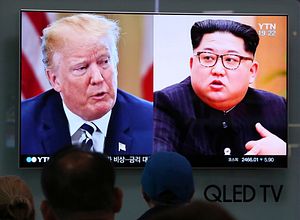In his 1934 novel Tender Is the Night, F. Scott Fitzgerald recounts the following dialogue between his alter ego, Dick Diver, an alcoholic psychiatrist, and his former lover, Rosemary, in which the doctor publicly admits that his life is caught in an inevitable downward spiral:
“Did you hear I’d gone into a process of deterioration?”
“Oh, no. I simply — just heard you’d changed. And I’m glad to see with my own eyes it isn’t true.”
“It is true,” Dick answered, sitting down with them. “The change came a long way back — but at first it didn’t show. The manner remains intact for some time after the morale cracks.”
Dick’s self-diagnosis is applicable to the current state of U.S. foreign policy: U.S. President Donald Trump’s decision to cancel the scheduled June 12 summit with North Korean leader Kim Jong-un is yet another signpost for the deterioration of U.S. stature in the world — and unlike Dick Diver, Trump’s manner cannot camouflage this decline.
While the cancellation of the summit is not fundamentally changing the relationship between the United States and North Korea — with or without the summit, total North Korean denuclearization paired with economic liberalization was and is an illusion to say the least — the impact of Trump’s unilateral decision to nix the meeting in Singapore on U.S. allies and partners cannot be overstated.
It essentially illustrates that neither flattery nor treating Trump like a normal president are viable strategies. South Korean President Moon Jae-in attempted the former by frequently praising Trump and even suggesting that he could get the Nobel Peace Prize for a successful summit with Kim, only to see this diplomatic initiative, into which he invested substantial political capital, squandered. (The same can be said for Japan’s Shinzo Abe on a different diplomatic front.)
France, Great Britain, and Germany attempted the latter only to have Trump earlier this month announce that the United States would unilaterally withdraw from the 2015 Joint Comprehensive Plan of Action (JCPOA) between Iran and the P5+1 and the European Union.
The result is that the United States is increasingly seen as a less reliable ally and partner. It may also leave Asians and Europeans with little other choice than to circumvent the United States in future diplomatic and security initiatives. This creates fissures that U.S. adversaries are all too keen to exploit and makes the specter of “decoupling” — the separation of the United States and from its allies — a possibility.
Yet, it would be wrong to blame this deterioration of relations entirely on Trump. The type of international politics that the president is conducting is perhaps dilettantish in its execution — maybe a more gradual bottom-up dialogue process might have yielded better results — but nevertheless may be perceived as broadly in line with more hawkish Democratic and Republican foreign policy traditions.
Indeed, the perceived decline of U.S. standing and power — as with Dick Diver in Tender Is the Night — really is a process years in the making. It became more apparent with the ill-fated invasion of Iraq in March 2003, though there was wishful thinking on both sides of the Atlantic and Pacific that the rupture would be temporary and pass.
In that respect, the cancelled summit and the invasion in Iraq play to the one of the biggest fears of U.S. allies and partners (not to mention U.S. adversaries): unilateral U.S. military action. It was this fear that drove Moon to flatter Trump as peacemaker in the first place. It was also the dread of a new war in the Middle East that made the Europeans push for the United States to uphold the JCPOA (besides economic interests).
Today’s abrupt cancellation of the summit, while possibly preventing an even more serious diplomatic blunder by Trump on June 12 given the hyped White House expectations for a breakthrough, makes the U.S. that much weaker and more alone. And while it is unlikely that we will return to the pre-PyeongChang Winter Olympics war scare, there should be no doubt that the nixing of the summit is increasing the chance of a military confrontation on the Korean Peninsula.

































